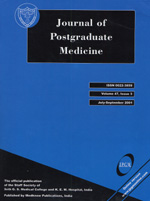
|
Journal of Postgraduate Medicine
Medknow Publications and Staff Society of Seth GS Medical College and KEM Hospital, Mumbai, India
ISSN: 0022-3859
EISSN: 0022-3859
Vol. 50, No. 3, 2004, pp. 167-172
|
 Bioline Code: jp04054
Bioline Code: jp04054
Full paper language: English
Document type: Research Article
Document available free of charge
|
|
|
Journal of Postgraduate Medicine, Vol. 50, No. 3, 2004, pp. 167-172
| en |
Clinical and familial correlates of tardive dyskinesia in India and Israel
Bhatia T, Sabeeha MR, Shriharsh V, Garg K, Segman RH, Uriel HL, Strous R, Nimgaonkar VL, Bernard L, Deshpande SmitaN
Abstract
Background: Antipsychotic drugs are widely used for the treatment of psychosis, especially schizophrenia. Their long-term use can result at times in serious side-effects such as Tardive Dyskinesia (TD). Since over 80% of schizophrenia sufferers (lifetime prevalence 1%) receive long-term antipsychotic drug treatment, the extent of the problem is potentially large. Increasing age is the most consistently demonstrated risk factor for TD.
Aims: To assess effect of different clinical factors and demographic variables in India and Israel and sib pair concordance of Tardive Dyskinesia (TD) in India.
Settings and Design: The study was conducted simultaneously among Indian and Israeli subjects: ascertainment was family-based in India and hospital-based in Israel.
Methods and Material: In India the instruments used were: Diagnostic Interview for Genetic Studies (DIGS), Positive and Negative Syndrome Scale (PANSS), Abnormal Involuntary Movement Scale (AIMS), and Simpson Angus Scale (SAS). The last three instruments were also used in Israel.
Statistical Analysis: Regression analysis and Pearson's correlation.
Results and Conclusions: TD symptoms were present in 40.4% of 151 Israeli subjects and 28.7% of 334 Indian subjects. While age at onset and total scores on PANSS were significant predictors of TD in both the samples, lower scores on the Global Assessment of Functioning Scale (GAF), diagnostic sub-group and male gender were significant predictors among Indians. There was no concordance of TD symptoms among 33 affected sib-pairs from India.
Keywords
Tardive dyskinesia, schizophrenia, genetic, familial
|
| |
© Copyright 2004 Journal of Postgraduate Medicine.
Alternative site location: http://www.jpgmonline.com
|
|
